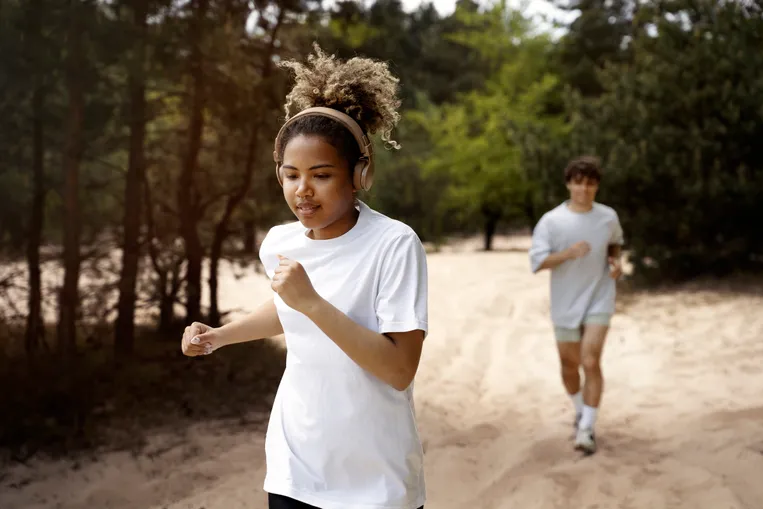
Exercise is known to make us feel good. It may not always feel fantastic when you are mid-run, panting for breath, or near the end of strenuous push-ups. Ultimately, we are often left feeling on top of the world. This is due to the combination of neurochemicals released by our brain during exercise.
The latest research has shown that exercise doesn't just make us feel good but also improves our memory, cognitive performance, and ability to learn. That's why we at Coachbit have included exercise and movement in our Morning Routine - a set of three habits built to boost brain health and cognitive performance.
Exercise Improves Mental Health
We feel upbeat and supercharged after a bout of exercise due to the 'feel good' neurochemicals released by our brain during exercise - dopamine, serotonin, and endorphins. These chemicals improve our mood and have been shown to impact our overall mental health positively.
During exercise, our brain also produces a potent growth factor known as Brain-Derived Neurotrophic Factor (BDNF). BDNF is made up of a bundle of proteins known to play a significant role in combating anxiety, depression, and stress.
In an unpublished study, Dr. Wendy Suzuki, a neuroscientist at New York University, found that research participants who took part in 45-minutes of cardiovascular exercise, 2-3 times a week, for a period of three months experienced an improvement in mood, body image, and overall motivation.
In another of Dr. Suzuki's unpublished studies, it was found that participants in their twenties who cycled for an hour experienced decreased anxiety, depression, and hostility for two hours after their workout. In addition, their energy levels increased.
Exercise Improves Learning and Focus
It just so happens that the BDNF produced in the brain during exercise goes directly to the hippocampus - the area of the brain responsible for learning and memory. In the hippocampus, it stimulates neurogenesis (the creation of new brain cells) and neuroplasticity (the brain's ability to change in response to experience and learning. Other studies indicate that the BDNF produced during exercise increases the actual size of the hippocampus.
Read more about the many benefits of BDNF here.
It is not surprising then that the participants of Dr. Suzuki's study on the effects of weekly cardiovascular training exhibited improved cognitive performance and performed better in recognition and spatial memory tasks. Simply put, exercise supports the production of BDNF, which creates new brain cells and increases our ability to learn and remember new information.
Exercise Promotes Brain Health
In her viral 2018 TED Talk entitled 'The Brain-Changing Benefits of Exercise' Suzuki described perhaps the most remarkable effect of exercise on the brain. In a 44-year longitudinal study of Swedish women between the ages of 38 to 60, it was found that higher cardiovascular fitness is associated with a decreased risk of Dementia. This can be explained by the impact of BDNF on the hippocampus -- the center of memory in the brain. Exercise can protect the brain against neurodegenerative diseases like Alzheimer's and Dementia.
Tips to Get Kids Moving:
The research is clear - exercise has many positive effects on learning, brain health, and mental health. That's why it is essential for adolescents whose brains are developing rapidly. School or extracurricular sports are a fun, social, and competitive way to introduce exercise into teenagers' routines. If your child is not so inclined, we've put together a few tips to get them started and introduce movement into their daily routines.
1. Start Small
Like every habit we have built into our curriculum at Coachbit, starting small is pivotal. This ensures that habits are sustainable, goals are realistic, and success is achievable. It only takes ten minutes of light aerobic exercise (such as walking) to trigger the release of mood-boosting chemicals.
To tap into the cognitive benefits of exercise, 30-45 minutes of cardiovascular exercise, 2-3 times a week, is recommended. That doesn't mean that's where you need to begin, nor does it mean running endless miles or sweating it out on the bike (although you are most certainly welcome to). Even just a brisk walk will do!
Remember that even just one session of exercise, between 10 and 30 minutes, can have immediate benefits on cognitive performance and overall mood. So even if you can't fit in 2-3 sessions a week, your brain will still thank you!
If a 30--45-minute walk is daunting or unrealistic, a 15--20-minute walk may be a better starting point. Introducing a walk, or even a light jog, into your routine as a family is also a great way to keep your child accountable.
2. Start in the Morning
Neuroscience suggests that the best time to exercise is just before you need to use your brain. According to Dr. Suzuki, your brain will be at its sharpest for two hours (probably even longer) after exercise. That's why she recommends that the best time to exercise is in the morning.
Exercising earlier in the day also avoids a spike in cortisol, which affects sleep quality.
With busy school schedules, manic morning rushes, and notoriously sleepy teenagers, this may not always be feasible. That's why starting small is so important. Our BrainScrub routine encourages just a small morning movement habit before beginning the day -- such as a set of push-ups, minutes of skipping, or star jumps. Over time, the length or intensity of the exercise grows, as do the brain-boosting benefits.
3. Start Outside
Studies show that the production of BDNF during exercise is affected by air quality. Participants of the study who exercised in fresh and clean air exhibited significantly higher levels of BDNF than those who exercised in polluted air.
In addition, exposure to sunlight directly contributes to the production of BDNF. This explains why our levels of BDNF have been shown to increase during spring and summer, whereas, in the colder and darker seasons, they decrease.
If the weather conditions allow for it, we strongly recommend exercising outdoors, especially if your child spends long periods indoors during the day. Another great way to get outdoors as a family is to go on a hike or a walk on weekends. A dog that needs walking or a garden that needs raking is another opportunity to get your child outside and moving -- and get a chore done.
Final Thoughts
At Coachbit, we have based our curriculum on the latest neuroscience research. That's why we have seen such success with our BrainScrub habits. Exercising doesn't come naturally or easily to all, but our bodies are made to move, and our brains reap the benefits. For focus, learning, memory, and mood, we highly recommend exercising in small steps in the morning and outdoors!
Recommended Resources:
Andrew Huberman Podcast: Dr. Wendy Suzuki: Boost Attention & Memory With Science-Based Tools
Wendy Suzuki, Health Brain, Happy Life: A Personl Program to Activate your Brain and Do Everything Better.
How many core habits and skills is your child missing?
Take our short quiz and find out.
Take our quiz
_Z5TrlU.webp)

